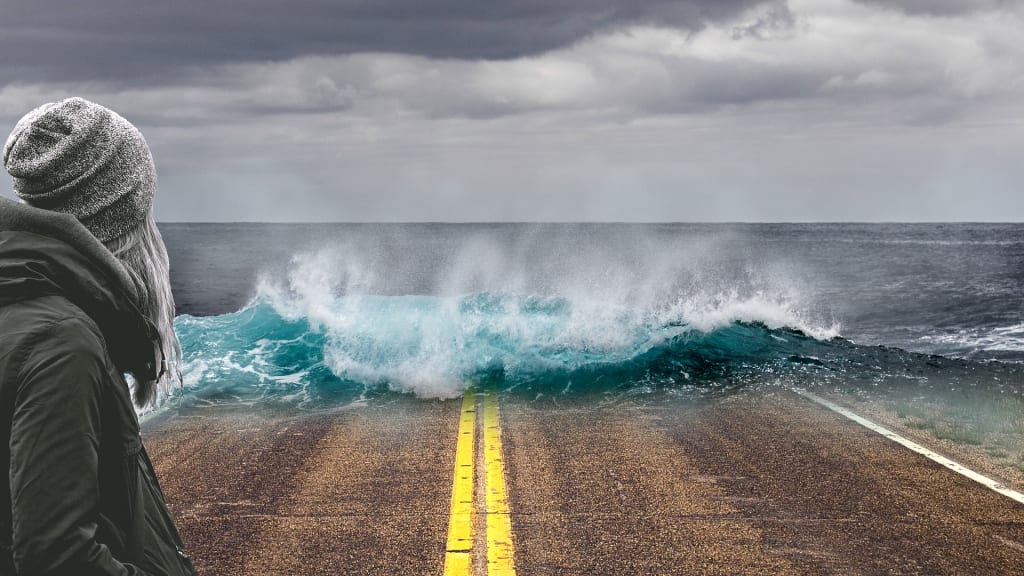
Man of the present age is moving towards such a destination. That has forgotten all about climate change, its effects and measures. Just ignoring climate change in big buildings, cool cars is considered a successful life. Due to such negligence, the lives of human beings all over the world are in danger today.
In this regard, a recent UN report states that the total global temperature has risen 1.5 degrees above normal. The world has been warned that if the mercury rises to 2 degrees, dangerous consequences will be found, 400 million people will face heatwave. The report added that if global warming is not stopped, it will have a profound effect on the lives of various creatures, including humans, in the coming decades.
According to experts, what is climate change?

In 2016, in the African country of Rwanda, 150 countries signed an agreement to stop global warming. At present, the average global temperature is 15 degrees Celsius, but geological records show that it used to decrease in the past. However, the current change in temperature is happening much faster than the changes in the past. Scientists are concerned that this rapid change in human hands will have a severe impact on the Earth's climate in the future.
What is the greenhouse effect?
The greenhouse effect is the natural process by which the earth captures energy from the sun. The heat from the sun is reflected back to space after hitting the earth's surface in the form of light, but the gases in the air absorb some of that heat, causing the lower part of the air to evaporate. And the Earth's surface both warms up. If it weren't for this process, the Earth would be 30 degrees colder then, and it would be very difficult to live on it.
Scientists say that humans are promoting the natural greenhouse effect by injecting greenhouse gases into the atmosphere through factories and agriculture, which is causing temperatures to rise. This process is called global warming or climate change. The most important greenhouse gases are water vapor, but they remain in the atmosphere for only a few days. In contrast, carbon dioxide lasts longer.
Humans are increasing the amount of carbon dioxide in the atmosphere by burning natural fuels and cutting down forests that absorb carbon dioxide. It also emits nitrous oxide and methane, but their overall effect is small. After the Industrial Revolution of 1750, the amount of carbon dioxide in the atmosphere increased by 30%, while the amount of methane increased by 140%. Has happened The amount of carbon dioxide in the atmosphere today is unprecedented in the last eight million years.
What is the evidence of global warming?

Temperature records show that the average global temperature has risen by 0.8 degrees over the last hundred years. This is an increase of 0.6 percentage points over the last three decades. Data from artificial planets show that sea levels have risen three millimeters a year in recent decades.
The main reason for this is that the water heats up and spreads. However, another reason is that the glaciers and polar ice caps in the mountains are melting. Satellite imagery shows a dramatic reduction in polar ice. In addition, the behavior of animals and plants have changed. Now the flowers bloom prematurely and there is a difference in the migration and behavior of animals.
A break in global warming?
In recent years, there has been significant debate over whether global warming which has stopped. Experts say there has been no significant global warming since 1998, although carbon dioxide emissions continue to rise. Evaporation reduction, absorption of ocean heat, but there is disagreement as to what is the real mechanism of this disruption.
Environmental scientists say that this disruption is only one component of climate change, the average surface temperature occur, but the second component, the melting of ice and the change in the behavior of plants and animals, shows that the earth is still warming.
How hot will the earth be in the future?
The International Panel on Climate Change released an estimate in 2013 that made various predictions based on computer models. They show that global temperatures could rise by 1.5 degrees by the end of the 21st century. Even then, scientists say their effects will continue for a long time, as different parts of the ecosystem, such as water and ice layers, take hundreds of years to respond to changes in temperature.
What effect will this have on us?
The full effect is uncertain, but it is estimated that it will reduce the supply of clean water, cause major changes in food production, and cause floods, storms, famines and heat waves. The rise could lead to mass deaths. Scientists say there will be an increase in overall rainfall, but there will be droughts in areas far from the sea and the duration of summer will increase.
Rising sea levels will increase the risk of storms and floods, but will have different effects in different parts of the world. The worst affected will be the poor countries where resources are lacking to cope with the change. Many species of animals will become extinct due to the sudden change of seasons. The World Health Organization (WHO) has warned that malaria, waterborne diseases and famine will kill millions of people. In addition, the absorption of carbon dioxide into the oceans will increase their acidity. This will have a detrimental effect on marine life and coral reefs.
Global Environment Agreement
To protect the Earth's environment, more than 150 countries have agreed to reduce emissions of certain types of greenhouse gases called hydro-fluorocarbons. Also used in conditioners and sprays. And they are a major cause of global warming.
About the Creator
Mohammad Arif
I am health professional and freelance writer, who have 4 years of experience in the field of freelance writing. I also offer paraphrasing/rewriting services to my clients.I love to work on subjects like HEALTH & fitness, fashion, travel.






Comments
There are no comments for this story
Be the first to respond and start the conversation.